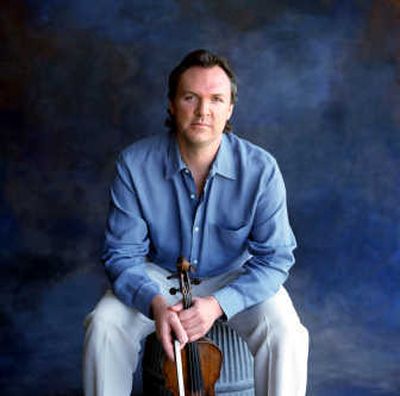Seeing Double

The “double-stop” is a violin and fiddle technique, yet you might say that Mark O’Connor is executing another kind of Spokane double-stop. Today, O’Connor will play a concert with the Spokane Youth Symphony at the Martin Woldson Theater at the Fox.
On Monday, he’ll be the keynote speaker at the 16th annual Spokane Scholars Foundation Banquet at the Spokane Convention Center.
This is a fortunate circumstance for Spokane residents, who can not only see a fiddle/classical legend perform at a bargain price, but also hear him deliver a talk – something he has done at places such as Harvard University.
We’ll let O’Connor describe how this all came about.
“The request for the speech came in and I gave it to my agent and said, ‘It’s an awful long way to go,’ ” he said by phone from his New York home.
He asked if there were any kind of musical gig to pair it with. O’Connor originally hails from Mountlake Terrace, Wash., and has performed many times in Spokane, both as an up-and-coming kid fiddler and as world-renowned professional.
As luck would have it, the Spokane Youth Symphony had a concert scheduled at the Fox the day before the banquet. They leapt at the chance to get O’Connor as their guest artist. Youth symphony conductor Verne Windham called O’Connor “either the greatest fiddler to play the violin or the finest violinist to play the fiddle.”
O’Connor was pleased with that solution, as well, because it gives him a chance to do something he’d like to do more often.
“I generally perform about 70 concerts a year, of which I might perform with a youth orchestra two or three times,” he said. “The rewards are easy for me: I love working with young people in this fashion.”
O’Connor plans to perform his piece “Strings and Threads,” a suite of 13 tunes that traces the evolution of folk music in America. He’ll break the suite into sections, so that each of the Youth Symphony’s orchestras can be involved in his performance.
He’s also planning to do an excerpt from his Fiddle Concerto. O’Connor began his career as a fiddler, and later branched into classical composition and performing.
“I represent a different path than many of these students have been exposed to yet,” said O’Connor. “The window and the door opens just a little more as to the possibilities of what they can do.”
His talk the next day, at the sold-out Spokane Scholars Foundation Banquet, may touch upon a few of those same themes. O’Connor said he will probably talk about “American Classical Music,” a genre which he helped define with his first foray into classical composition in 1996.
“It all started when ‘Appalachian Waltz’ was released with Yo Yo Ma,” said O’Connor. “The Sony marketing people came up with that slogan, ‘American Classical Music,’ and it really seemed to stick.
“That album and project turned out to be so successful. Between the ‘Appalachian Waltz’ and ‘Appalachian Journey’ albums, it did 1 million in record sales. And those were string trios, not popular music.”
The Spokane Scholars Foundation is an all-volunteer organization founded on the premise that high scholarly achievement deserves to be held in esteem. It has distributed more than $750,000 in grants over the past 16 years.
About 640 people are expected at this year’s banquet, which will honor more than 120 students from 24 high schools, nominated by their principals, counselors and teachers.